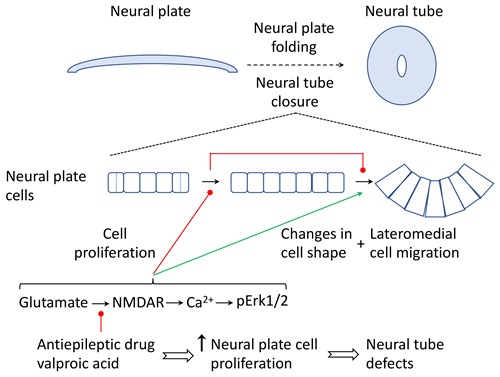Antiepileptic Drug Induces Birth Defects in Frogs
A common drug for treating epileptic seizures may lead to birth defects if used during pregnancy by interfering with glutamate signaling in earliest stages of nervous system development, finds a study in frogs published in JNeurosci. The research could inform the development of new epilepsy medications that are safer for pregnant women.

The brain and spinal cord begin as a group of cells in the embryo that folds in on itself to form the neural tube. Some of the most common birth defects, such as spina bifida, are caused by a neural tube that fails to close completely. The side effects of antiepileptic drugs are thought to contribute to the prevalence of birth defects among children of epileptic mothers, but the mechanisms involved are not known.
In their study of clawed frogs, Laura Borodinsky and colleagues investigated the role of neurotransmitters in neural tube development. They found that the neurotransmitter glutamate and N-methyl-aspartate (NMDA) receptors play an important part in the proliferation and migration of the cells that form the neural tube, which was compromised in embryos treated with the widely-used antiepileptic drug valproic acid and led to defects.
Article: NMDA receptor signaling is important for neural tube formation and for preventing antiepileptic drug-induced neural tube defects
Corresponding author: Laura Borodinsky (University of California Davis and Shriners Hospital for Children Northern California, Sacramento, USA), lnborodinsky@ucdavis.edu





















